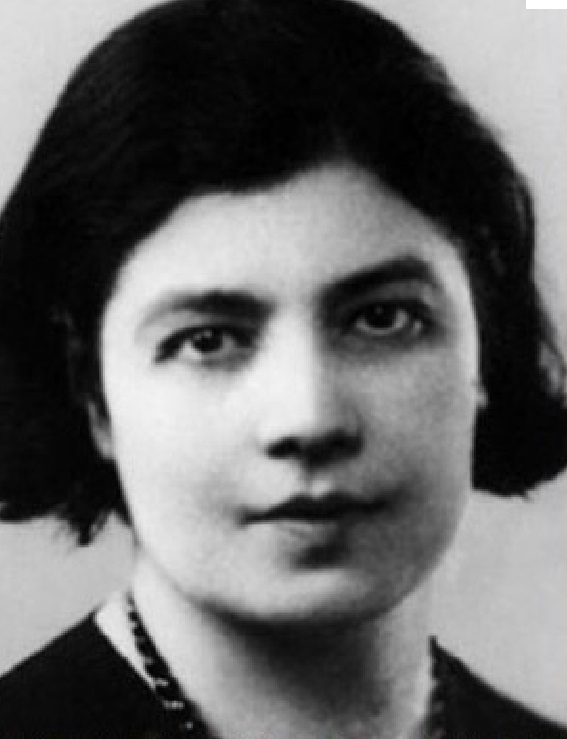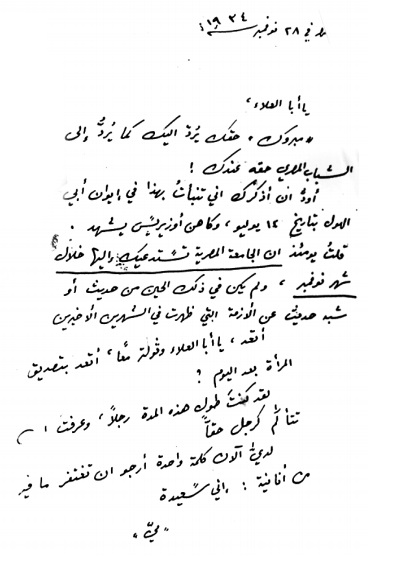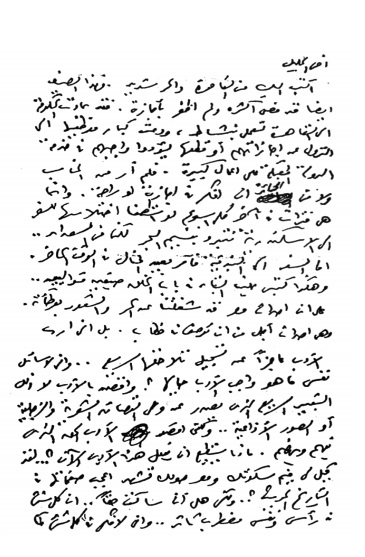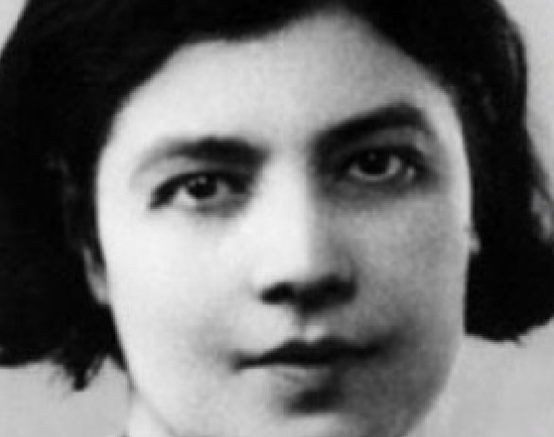Although her name was associated with the most important writers and writers of the period in which she lived, she passed away and no one who attended her cultural and literary salon attended her funeral or who were attached to her.
Rumors, stories and harsh experiences surrounded her after she was admitted to a mental health facility, and she was discharged from the sanatorium and lectured at the American University in the presence of judges who were examining the issue of the inheritance dispute between her and her relatives, and her journey ended by a lonely woman after she was and still is one of the famous people of her time, and was buried in the cemeteries of the Maronites in Ancient Egypt next to her parents.
Mai Elias Ziadeh (her real name is Mary) was born in the city of Nazareth in northern Palestine in 1886, her father is a Maronite of Lebanese origins, and he was a teacher, and her mother is Nuzha Muammar, an Orthodox who is considered one of the authors of literature, especially poetry, and May Ziadeh received great attention from her parents being Only daughter.
In 1908, Mai moved with her family to Cairo. She entered the Egyptian University in 1916, and studied philosophy and literature and mastered the French, English, Italian and German languages, and worked as a teacher of both French and English, and continued her studies in German, Spanish and Italian.
Mai Ziada moved between Lebanon, Palestine and Cairo, and education and journalism opened the doors for her to friendship and acquaintance with many journalists, thinkers and writers in Lebanon, Egypt and the Diaspora.
After she graduated from the Faculty of Arts in Cairo, the idea of Mai was born to establish her own literary salon, and to hold it every Tuesday of every week. She was distinguished by the broadness of the horizon, the accuracy of feeling and the beauty of the language.
Among its pioneers were: Wali al-Din Yakan, Taha Hussein, Khalil Mutran, Shibli Shamil, Yaqoub Sarouf, Anton al-Gamil, Ahmed Lotfi al-Sayed, Abbas Mahmoud al-Akkad, Mustafa Sadiq al-Rafi’i, Ahmad Shawqi, Ahmed Zaki, Rashid Rida, Mohiuddin Rida, Mustafa Abd. Al-Razak, Prince Mustafa Al-Shehabi, Amin Al-Maalouf, Salama Musa, Ismail Mazhar, Muhammad Hussein Al-Marsafi, Ibrahim Al-Mazni, Dawood Barakat, Zaki Mubarak, Abdul Rahman Shukry …

She served rose syrup or coffee in her only literary salon, which was run by a woman and had guests of both sexes. Her salon was distinguished by intellectual and social freedom, cultural movement, and the form of a source of literary production. She influenced the writers of her time in both human and artistic terms, and her speech was dominated by tolerance, friendliness and high politeness.
In this regard, Al-Akkad says: “What you talk is as pleasant as what you write after vision and preparation. It is endowed with the queen of hadith, which is the queen of guidance and management of conversation between the council of those who differ in opinion, mood, culture and language.” While the Dean of Arabic Literature, Taha Hussein, says: “Our salon was democratic and open, and I kept frequenting it on Tuesdays until I traveled to Europe to pursue studies. I liked it for its breadth of doctrines of speech, the dispersion of speech and the arts of literature, and I liked it as a place for speech in every tongue, and a forum for speech in all Science”.
As for the prince of poets, Ahmad Shawqi, he translated his impressions of May and her salon with a poem in which he says:
I ask my mind about what Spaniard
The best of manners or a good statement
I saw the good race in it
As if they were Lama lovers
May attracted the attention of creative people of her time in 1909 when her father Idris Bey Ragheb gave her newspaper “Al Mahrousa” and its printing press, so her father took over as editor-in-chief and began publishing her first articles. In 1911, her relationship with Gibran Khalil Gibran began through correspondence, without meeting them, and the correspondence between them lasted twenty years. Her literary fame began in Egypt in 1913, at the festival honoring Khalil Mutran that Salim Sarkis called for. At that time, she was assigned to deliver Gibran’s speech, and then she followed her with her speech, and she succeeded in both.
She also published articles and research in Egyptian newspapers and magazines. As for books, her first production in 1911 was a poetry collection that she wrote in the French language, and her first work in French was titled “Zahir A Dream.” Later on, it was published: “The Badia Researcher”, “Words and Signs,” “Equality,” “Darkness and Rays,” “Between the Islands and the Tide,” and “Al-Sahifat” and others.
She signed her articles in the Egyptian press, including “Al-Mahrousa”, under pseudonyms, including: “Shejia, Khaled Raafat, Isis Kobia, Aida, Kanar, The First Marine Sindadah.”
Most of the pioneers of her literary salon were part of unfinished love stories, and historians of her life believe that men’s admiration for Mai came because she was the “exceptional woman,” in comparison to the conditions of women in Egypt and the Arab world at the beginning of the twentieth century.
She was a liberal, educated Levantine woman fluent in a number of languages, opening her house to intellectuals to discuss and debate with them in her weekly salon in a male society. Therefore, some view May Ziadeh as a pioneering female model for what is called “feminism”.
Despite her pioneering role in the Arab literature movement for being one of the first advocates of writing “al-scattered poetry” and giving the literature letters a central value in modern narration, all of her roles were reduced to the image of the woman whom writers loved her, perhaps because these were not ordinary men.
Among the celebrities of the literary community, it was reported that May loved only Wali al-Din Yakan, who was a poet of Circassian origins, and gained his fame from being a figure opposed to the Ottoman Sultan and when he died, she wore mourning clothes.
May Ziada wrote to the flags of her time, including politicians, thinkers, journalists, poets, and writers, and she wrote to a number of women activists in Syria, Lebanon and Egypt.

Mai developed the art of correspondence in content and form, and introduced into it existential questions, the ingenious description of the transformations of nature, internal efficacy, criticism of books, and women’s rights, her style was based on good transition to the main idea and the skill of the dialogue, the accuracy of the phrase and condensation, the wit and clarity, and she made the message a focus Intellectually, not just emotions and feelings.
Many love stories in her life, and I loved her: Taha Hussein, Abbas Mahmoud Al-Akkad, Ahmed Shawqi, and the sheikh of Al-Azhar at the time, Mustafa Abdel-Razek, Mustafa Sadiq Al-Rafi’i, and Antoun Al-Gamil … Her correspondence with Gibran Khalil Gibran remains the most important, as it extended to about 20 years without meeting them And they exchanged a complete virgin love.
May wrote in a letter confessing her love for Gibran, saying: “What is the meaning of this that I am writing? I do not know what I mean by it. But I know that you are my beloved and I fear love. I expect love so much and am afraid that it will not bring me everything I am waiting. I say this while I know that little There is a lot of love, but a little love does not satisfy me. Drought and drought and nothing is better than a little. ”

Mai played a role in defending the rights of women demanding equality, and she was one of the pioneers of the modern Arab women’s renaissance, and she frequently wrote, lectures and seminars. To demand women’s rights. She refused to let women experience the most severe forms of exploitation, and she also wrote a lot about women’s right to education.
After her father died, then her mother, and Gibran followed her, she subsequently returned to Lebanon in 1938, where her relatives mistreated her, and was admitted to a mental hospital in Beirut, and after she left, she stayed with the Lebanese writer and thinker Amin al-Rihani, then returned to Egypt and visited many European countries to relieve themselves and settled in Egypt, and died on October 19, 1941 in Cairo, at the age of 55. Only: Ahmed Lotfi Al-Sayed, Khalil Mutran, and Antoine Gemayel walked at her funeral.
Has May’s wish been fulfilled after 80 years of her departure? Writer May says in her diary: “I hope that after my death someone will do justice to me and extract from my small writings the truthfulness and sincerity it contains !!” May’s Umniah appears closer to expectation, after writers of fame-seekers violated her life, which prompted the Egyptian writer and journalist Safinaz Kazem to attack those who violate Mai’s biography, saying that “what she wrote must be read and researched by herself.” And Kazem wrote: “It is not permissible to violate the biography of Miss Mai Wilt and knead in it to every unrighteous ignorant without understanding and without research and reading in her papers, which were personally available after the respected researcher Salma Haffar Al-Kuzbari collected them and published them in her book ‘May Ziada or the tragedy of genius’”
References
* “May Ziada among Arab women writers in the past and present,” Heba Al-Wadi is a gift.
* “May Ziadeh … Her Biography, Literature, and Unpublished Papers,” Khaled Muhammad Ghazi.
* “May Ziada in Her Life and Its Effects,” by Dad Sakakini.
* “May Ziada, Yasmina Al Nahda and Freedom,” Khalil Al-Bitar.
* “Women in the literary, informational and cultural discourse,” Haitham Ahmad Al-Azzam and Abdel-Rahim Marashdeh.
* “Those who loved Mai .. and the operetta is beautiful,” Kamel El-Shenawy.
* “Adult Grams at May Ziadeh Salon”, Anis El-Deghidi.
* “May Ziada and her literary lovers,” Ahmed Al-Tawili.
* “The Butterfly of Literature … Mai Ziada”, a documentary film. Al Jazeera Documentary.
* “Smiles and Tears … German Love”, Frederick Mix Muller.
* “May Ziada or the tragedy of genius,” Salma Haffar Kuzbari.
Source: https://tekdeeps.com/may-ziadeh-is-a-pioneer-of-womens-rights-adults-loved-it-and-she-left-alone/


Be the first to comment on "May Ziadeh is a pioneer of “Women’s Rights … Adults Loved It and She Left Alone!"